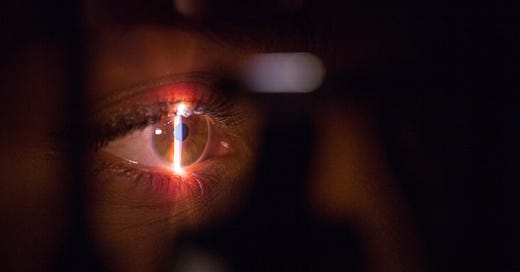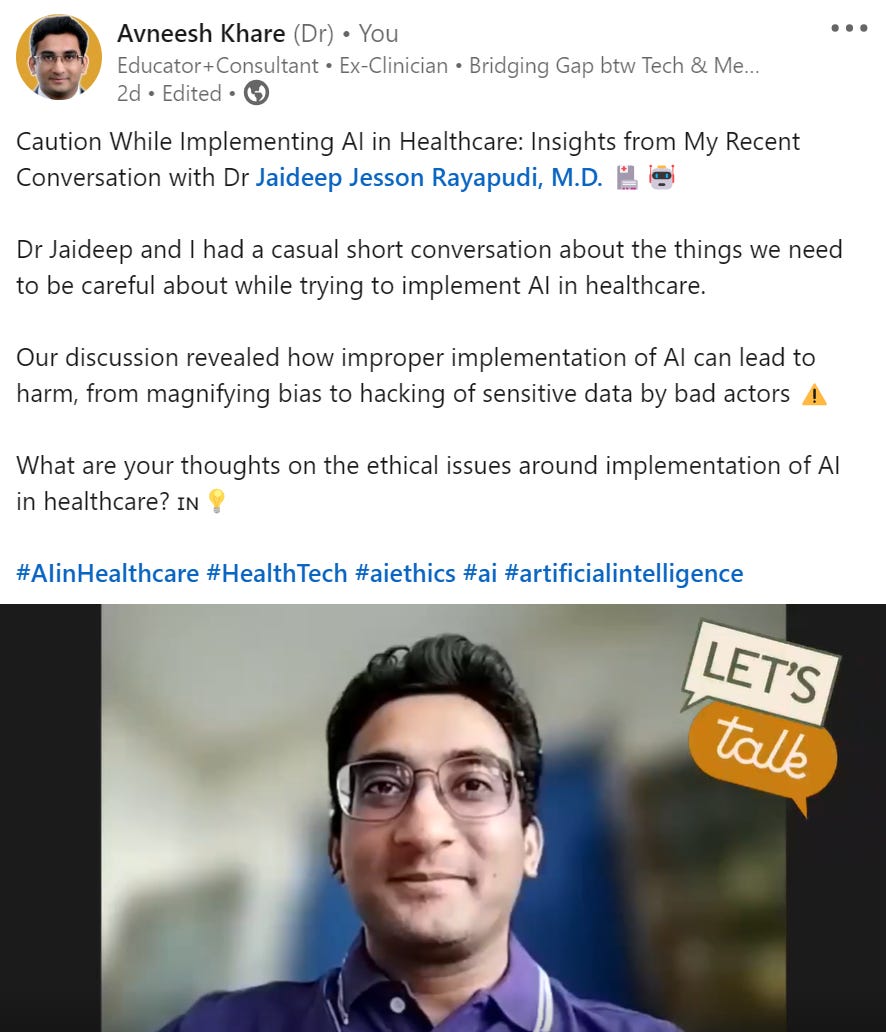Med AI's Transformative Impact: Detecting Eye Diseases, Enhancing Diagnosis, and Beyond 🤖
Weekly Updates on AI in Medicine 🤖🩺🚀
“The promise of artificial intelligence in medicine is to provide composite, panoramic views of individuals’ medical data; to improve decision making; to avoid errors such as misdiagnosis and unnecessary procedures; to help in the ordering and interpretation of appropriate tests; and to recommend treatment.” ― Eric Topol, Deep Medicine: How Artificial Intelligence Can Make Healthcare Human Again
Dear Med AI Enthusiast,
Welcome to this edition of ‘The Med AI Capsule’ Weekly Newsletter! ⚕️🤖💊 I'm really excited to have you with me as we dive into the fascinating world of Medical AI.
In this newsletter, I'll be your guide, taking you through the latest news updates and thought-provoking ideas in the ever-changing field of artificial intelligence in medicine.
Whether you're an interested medical professional, a tech enthusiast, or just curious about the future of medicine, 'The Med AI Capsule' is here to lead the way and show you the exciting possibilities and cautionary areas for AI in medicine.
So, get ready for an adventure, and let's explore this thrilling journey together!
In today’s capsule:
6 Med AI News Updates (Including 1 Deep Dive)
1 Med AI Event
1 Med AI Work Opportunity
1 Med AI Tool
Social Post of the Week
1 Fun Fact
Reading Time: 5-7 minutes
AI Detects Multiple Health Conditions from Retinal Images 🤖🔍

Scientists have developed an artificial intelligence (AI) tool called RETFound, which can analyze retinal images of people's eyes to diagnose and predict various health conditions, such as eye diseases, heart failure, and Parkinson's disease.
Unlike traditional methods that require labelling each image, RETFound uses a self-supervised learning approach similar to how ChatGPT learns language, making it more efficient and cost-effective.
The AI model learns from a large number of unlabelled images to understand what a healthy retina looks like and can then be fine-tuned to detect specific diseases.
Why is it important?
The tool can help doctors quickly detect and predict health problems by looking at pictures of people's eyes.
This can catch diseases like eye issues, heart trouble, and Parkinson's disease early when they're easier to treat.
It's faster and cheaper than other methods, making it a valuable tool for healthcare.
“If you have some systemic cardiovascular disease, like hypertension, which is affecting potentially every blood vessel in your body, we can directly visualize [that] in retinal images.” - Pearse Keane, an ophthalmologist at Moorfields Eye Hospital NHS Foundation Trust in London
Remember:
To maximize RETFound's value in healthcare, developers and users must prioritize ethical, transparent use while addressing potential limitations and biases.
Ongoing updates and evaluation will be vital to sustain its accuracy and utility across diverse medical contexts.
Other Med AI News:
A recent study in the Netherlands suggests that the AI model ChatGPT could assist in diagnosing patients and reducing emergency department wait times, with a 60% overlap in suggestions with clinicians.
However, it's not yet ready for practical use due to privacy concerns, though it holds promise for improving healthcare efficiency.
A recent study highlights the effectiveness of the Viz Aneurysm machine learning algorithm in detecting previously unnoticed unruptured cerebral aneurysms, addressing the crucial need for early identification to prevent life-threatening ruptures.
Nevertheless, it emphasizes the importance of combining AI with human clinical judgment for comprehensive healthcare.
A recent Indian study developed a Deep Leaning (DL) model for gallbladder cancer detection using ultrasound, showcasing its effectiveness in various clinical situations.
The DL model offers high sensitivity and accuracy comparable to radiologists, potentially aiding early GBC diagnosis, especially in regions with limited access to specialized healthcare.
Further research in multiple clinical settings is needed to validate its broader applicability and impact on early diagnosis and prognosis.
University of Houston researchers received $3 million to develop an AI system for diagnosing lupus nephritis, a critical complication of lupus.
As compared to current kidney biopsy-based diagnoses, AI could improve accuracy, potentially transforming patient management and outcomes.
While AI has potential, it should be integrated with medical expertise to ensure accurate diagnoses and effective patient care.
ChatGPT suggested a rare neurological condition, tethered cord syndrome, which turned out to be accurate, highlighting the potential of AI in medical diagnosis.
While AI can provide valuable insights, it should complement, not replace, professional medical expertise. Collaboration between AI and doctors is essential for accurate diagnoses.
MED AI EVENT
MED AI WORK OPPORTUNITY
MED AI TOOL
GLASS HEALTH - AI-Powered Clinical Decision Support
Glass Health empowers clinicians with its AI platform for developing differential diagnoses and drafting clinical plans.
SOCIAL POST OF THE WEEK
Let’s wrap it up with a historical fun fact!
The term "artificial intelligence" originated in 1956, as a name for a summer conference held at Dartmouth University organized by computer scientist John McCarthy. (Reference)
Stay tuned for our upcoming editions as we explore the latest breakthroughs and dive deep into AI's transformative power, shaping a healthier future.
Warm regards,
P.S.: If you're a medical professional intrigued by artificial intelligence, but not sure where to start, feel free to reach out to me for personalised guidance HERE.
You can also check out my CPD-accredited Med AI course on the Bionabu (UK) platform and join our vibrant Med AI WhatsApp Community.
Follow me on LinkedIn and Twitter
Voluntary Disclosure: Generative AI tools were employed to help me in making this newsletter better for you.








